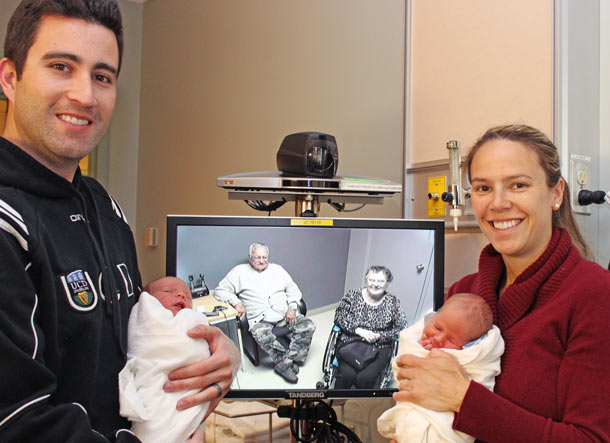

THUNDER BAY – HEALTHBEAT – When the moment arrives for an expectant mother in Thunder Bay to give birth, getting to the hospital might take 15 to 30 minutes. But what if she lives in Atikokan, Manitouwadge or anywhere else in Northwestern Ontario?
Between 25% and 30% of mothers who give birth at Thunder Bay Regional Health Sciences Centre (TBRHSC) are from communities outside Thunder Bay.
Some community hospitals simply do not have an obstetrics department or there may be too few physicians in the community or the pregnancy may be high risk, making it necessary for the mother to travel to Thunder Bay. TBRHSC’s Neonatal Intensive Care Unit (NICU) is the only designated Level II C perinatal unit in Northwestern Ontario, with the resources and expertise to care for critically ill or premature newborns 30 weeks gestation or older.
“We realize that mothers who have to travel to Thunder Bay to deliver their babies experience a lot more stressors than mothers who live here – arranging childcare for older children, the financial burden of paying travel and accommodation or the loneliness of being separated from family at a time when you most want family around,” says Maureen Colpitts, Manager, Labour and Delivery and Maternal Newborn.
The unit has taken steps to relieve some of the stress experienced by out-of-town mothers.
The full-time Maternal Child social worker is available for emotional and practical assistance and can help by providing supportive counselling as well as connecting mothers to external resources or accommodations. Families can also ask a member of their healthcare team to arrange tele-visitation with family members back home.
Parenting rooms allow mothers to spend the night with a baby who requires hospitalization. However, while a newborn may need to remain in NICU for some time, once the mother is healthy, she is discharged. If the mother does not have family or friends in Thunder Bay, the social worker can help her find affordable accommodation.
Premature newborns under 30 weeks gestation or with complex heart problems or who require surgery are transferred to the nearest, available Level III facility, usually in southern Ontario. When a baby is airlifted to another city for treatment, there may not always be room for the parents. In those cases, the parents are responsible for making and paying for their own travel arrangements.
Reimbursement programs, such as the Northern Health Travel Grant or the First Nations Inuit and Aboriginal Non-Insured Health Benefits Program, can help offset some of the travel and accommodation costs. For costs not covered under those programs or for individuals experiencing extreme financial hardship, other community organizations may be able to provide assistance.
The Women and Children’s Program developed a pamphlet “When You and Your Baby Need to Travel to Another Hospital Outside Thunder Bay” designed for moms dealing with pregnancy-related travel.
Colpitts says that issues faced by out-of-town mothers and newborns are high priorities for her and her colleagues in the Women and Children’s Program. “We are very much aware of the stress that moms and families face when they have to travel and we spend a lot of time discussing what we can do for those moms,” she says.
“Stress, financial hardship, high-risk pregnancies and sick newborns are the exception, not the rule. The good news is that most of our moms deliver safely and are able to travel home with their babies in a short period of time.”













